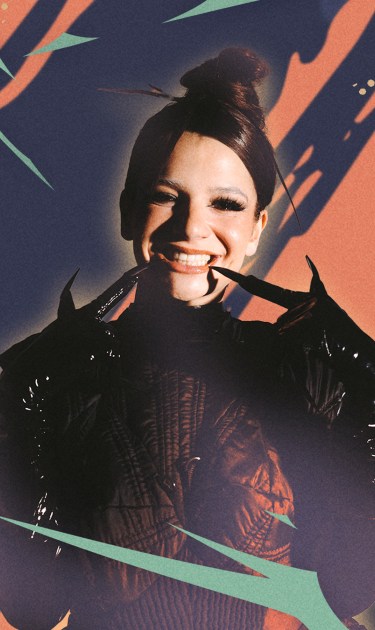“Anger is an easy feeling to express myself in,” says Jessica Díaz, known professionally as Mariposa. The young Amsterdam-born and raised Colombian rapper has been carving a sound that is equal parts emotional release and a head-nodding good time. Her self-described “euphoric alternative music” underlined by trap and neoperreo-like beats finds its latest evolution in her new EP Inframundo, a followup to her 2023 effort, Otro Mundo. And with it, another side of her personality. Mariposa deals with her problems in song, expressing her rage as well as dealing with mental health issues like generational trauma and PTSD, along with “lots of therapy,” as she clarifies. “I really want to present myself as who I really am,” she explains. “1.60 metros pero bien enojada.”
Fury has been a constant in her life. She was born in the Netherlands to a single Colombian mom and an Italian dad, the latter of whom was not really in the picture. “My mom is a very angry person. It’s the easiest emotion for her as well,” she tells us in a Zoom call from her home in Amsterdam about her upbringing. “My family line has a lot of angry women,” she chuckles. “I try to use anger to help me instead of [it] being something that blocks me, turning it into something that makes me more powerful and use it in a good way.” She describes how difficult it was for both mother and daughter to establish boundaries, even if the elder woman tried her best.
Looking for ways to channel her anger into something more positive, Mariposa found music. Tracks like “Myers” and “Schizo” boast claustrophobic beats and frantic rapping, while others like “Flow Violento” bring distorted dembow beats and autotuned vocals to the fore. “There was so much I wanted to say, and I felt that music was the best way to translate it,” the singer notes. She also found that by singing in Spanish, she could reach people who might be dealing with similar situations back in Colombia and everywhere in Latin America. In the process, she has found an audience in many of these countries.
Mariposa thinks that there aren’t enough women expressing such sentiments in music. She says that a lot of prejudices are confronted in her live shows, where she dresses in “cute outfits and trencitas” before confronting people with screaming and “jumping like a kangaroo” instead of TikTok-ready dances. This hasn’t stopped others from suggesting she should sing more or accommodate her image for better chances at commercial success. “It’s not really me, and it doesn’t feel authentic. I understand that it will take longer or be more difficult for people to understand what I’m trying to do, but… Así será,” she confesses with a laugh.

She took a page from one of the most visible female rappers from the last few years. Citing Cardi B as one of her biggest influences, she set an example for Mariposa to find her voice and image. “I wasn’t used to seeing Latina women in front of the camera rapping and embracing their sexuality instead of standing behind a [male] rapper. That was really new to me, and it felt very powerful,” she explains. Like Cardi, her music has allowed her to present herself as a very skilled rapper, as well as expressing her emotions. “I always want to make a production out of it,” she says about taking a very detailed-oriented approach. “Writing gets easier and more difficult because I really want to say stuff,” she says about her curiosity. “I want to throw punchlines and say stuff that will make people go, ‘What did she just say?’ [laughs].”
I really want to present myself as who I really am. 1.60 metros pero bien enojada.
For most of her life, her mother would take her to Colombia to visit family for two months at a time, bringing a heavy contrast to her life. “It was so different from the privilege we had in the Netherlands,” she remembers. “Like, we didn’t have hot water in Colombia, but I never felt that was bad. It was weird for me to adapt to the Netherlands because every time we went to the barrio where my mom grew up in, some shit was always happening [laughs], and nothing was happening here. It was safer here, and people are quiet and different. I would cry whenever we had to go back because it was very cold here, and I’m not just talking about the weather,” she says with another laugh. Although she acknowledges that she’s been Westernized a bit, she says she’s a proud Colombian.
Living in Amsterdam has fueled her feelings of ire. “Dutch people are very good at making you feel [like you are] not from here,” she shares, despite being born and raised in that country. However, as a universal experience for diaspora children, the same happened on the other side of her identity. Some Colombian acquaintances that her family frequented also made her feel weird for not behaving “like a lady.” And with few Latine people in the country, she points out that the closest to finding kindred spirits are immigrants from Suriname, the Latin American country colonized by France. She has since found people from Argentina and Peru — her “primos,” as she calls them — as well as others around Amsterdam, including her fiancé, to form her own adopted family.

Mariposa is all about confronting emotionally difficult issues head-on, giving a safe space for people to rage on. “I feel like mental health is a very important topic for me because I’ve been silenced for so long, and I don’t want to be silent anymore,” she says. “I don’t care if they call me crazy anymore. We need to talk about how women can be angry and how Latinos can feel anger, but we can also feel pain. We’re not angry all the time; we come from pain.”
“Sometimes when I’m doing a club song, I realize, ‘Maybe I shouldn’t talk about mental health stuff,’ but I still feel like I need to. To talk about something I don’t feel is important enough wouldn’t be speaking the truth y yo no miento,” she says.
